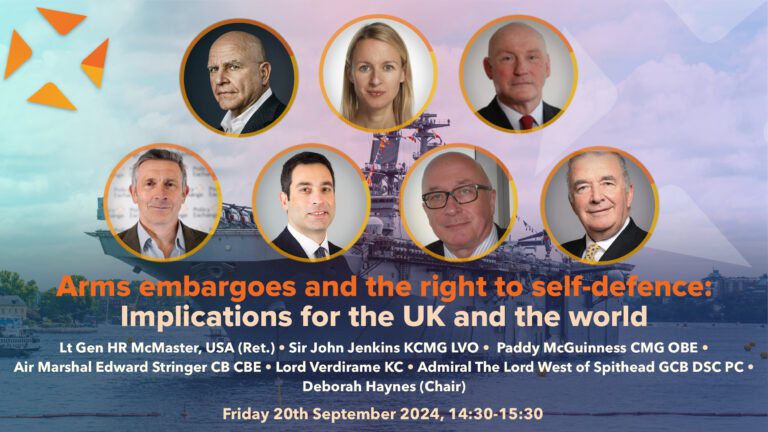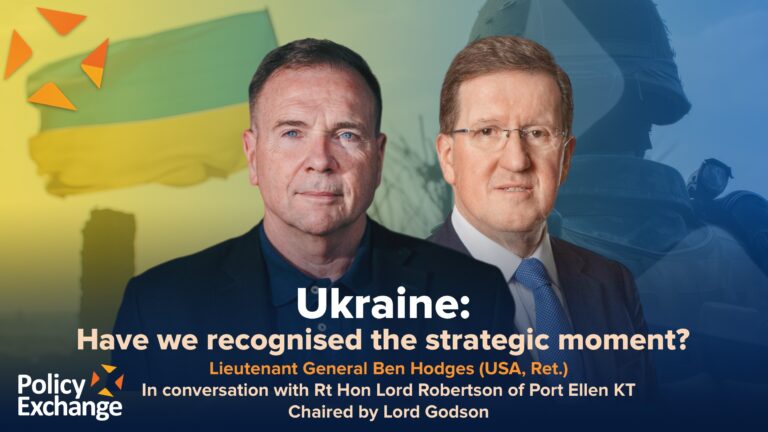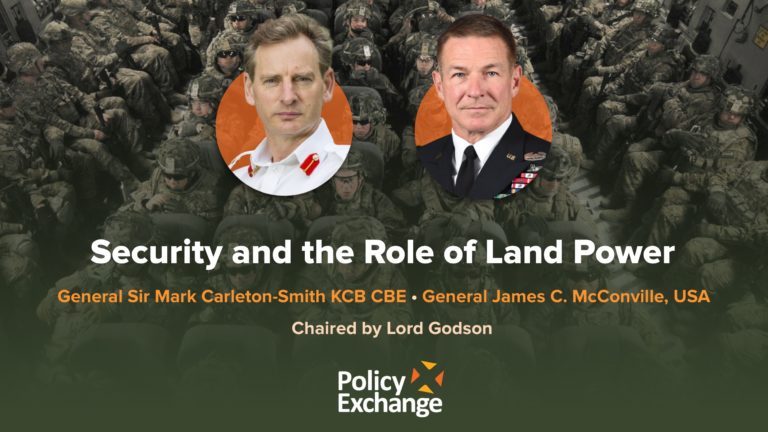Grotius Prize presented to Kaja Kallas, Prime Minister of Estonia, with recorded remarks by Rt Hon Boris Johnson MP and a Vote of Thanks from Rt Hon Liz Truss MP
On the occasion of receiving Policy Exchange’s 2022 Hugo Grotius Prize, Estonian Prime Minister Kaja Kallas gave an important speech on the need for Europe to continue to respond robustly to Russia’s aggression against Ukraine and warned against a premature peace.
The Prime Minister, the Rt Hon Boris Johnson MP, presented the prize — a seventeenth century copy of Grotius’s On the Law of War and Peace — to the Estonian Prime Minister in recognition of her contribution to upholding the international rules-based order.
—
Speech by Kaja Kallas, Prime Minister of Estonia
Ladies and Gentlemen,
I am really honoured to be here today. Actually, it is somewhat unbelievable that I’m receiving this prize, because it is literally the first lesson in law school that you are learning Hugo Grotius. It was also the first exam I ever failed. Had someone said to me back in 1995 that one day you will receive a Hugo Grotius prize, I would have laughed so hard – and so would have my professors. But miracles happen and here I am.
The international rules-based order begins from home. I was a teenager 30 years ago when Estonia climbed out of its totalitarian prison in 1991.
Totalitarianism is fixated on the destruction of individuals and freedom. In autocracy the individual does not matter. The individual does not have any rights.
After restoring independence and freedom following Soviet occupation, Estonia had a very difficult task: to build a free and open society, a parliamentary democracy with the rule of law at its core.
This was not an easy task – re-establishing a democratic relationship between the citizen and the state is nothing you do overnight, and it is nothing you can from books.
We started from zero or even sub-zero as the Soviet Union had normalised corruption, there was no rule of law – collective cause always prevailed over individual rights and liberties. This is best illustrated by the fact that during the Soviet occupation we practically only had criminal law as there was no private property – so there were no laws for safeguarding individual rights.
Autocrats do not care for the people, they only care for their power. Last year’s Nobel Peace Prize laureate Dmitri Muratov called this a question between, and I quote, “people for the state, or the state for the people.”
Life under Soviet occupation shaped the attitude of our people back then – the state was not ours but theirs – the occupiers’, so it was fine to steal from the state.
Establishing market liberalism and parliamentary democracy demanded a turnaround in attitudes and identity – the state was no longer “theirs” but “ours”. The assets were no longer “theirs” but “ours”. The rights of individuals and the rule of law were placed at the centre of governance. This meant rooting out corruption and building up strong institutions in support of a society and safeguarding individual rights.
I’m a lawyer by profession. Upholding agreed commitments and laws is central to my worldview. This ensures stability at national as well as at international level – in fact the way states treat their own citizens tells a lot about their international behaviour.
Staying true to laws and norms is a question of peaceful co-existence – it should stop countries from conquering their neighbours. It should allow countries to choose their own paths, their own foreign policy orientations, and their own alliances without being threatened by force. It should keep individuals safe and prevent grave human sufferings.
The best way to secure peace and stability is by staying true to the principles and commitments we have made to each other. This should mean that might makes no right and all countries would settle disputes peacefully. That is not the case today.
Russia is the most direct threat to European security right now. In fact, should it get away with its aggression, it would undermine peace and security around the world – if aggression pays off somewhere, it serves as an invitation to use it elsewhere.
That is the reason why we are so committed to helping Ukraine push back Russian aggression. What we are defending is the very idea of freedom, territorial integrity and sovereignty – that is, the right to exist as a country and the right to live free from repressions.
Securing and establishing this very idea was at the core when my own country was born in 1918. The United Kingdom played a key role in our ability to enforce this idea back then.
The decisive moment for the Estonian War of Independence against Soviet Russia over a hundred years ago came when a British naval squadron arrived in Tallinn. The arrival of British ships prevented the landing of the Soviet fleet in Tallinn at a time when the Estonian troops would probably not have been able to resist.
The British Navy in the Gulf of Finland ensured Estonia’s maritime security practically throughout the entire War of Independence from 1918 to 1920. And the weapons you sent in the winter and spring of 1919 were of critical importance to the Estonian battlefront. This ensured Estonia 20 years of independence prior to falling under Soviet occupation for 50 years.
You do not need to look hard for parallels with today and the importance of giving support to Ukraine. The United Kingdom plays an essential leadership role in securing these very same principles today.
Ladies and Gentlemen,
We live at a moment when aggression has come right up to Europe´s borders. Coming today from Estonia, I come literally from the frontline of the free world and democracy.
The Kremlin is trying to build another divisive wall in Europe and this time Estonia is lucky enough to be on the right side of it. The same cannot be said for Ukraine.
The rules-based order requires that crimes committed would get investigated, evidence saved and those in breach of laws held accountable. As a lawyer, it is in my DNA to demand justice for every crime committed.
Let us zoom out and have a closer look at what is at stake in Ukraine. We are witnessing Russia´s state-orchestrated calls for genocide.
The Russian killing machine wishes and I cite: “to change the bloody and false consciousness of a part of today’s Ukrainians”. These are the words of Dmitry Medvedev.
The Kremlin including Putin have made it clear with their statements that their aim is to wipe Ukraine off the world map. “Denazification” is the official Russian label of this policy of destruction of the Ukrainian state and its people.
According to the Genocide Convention, what distinguishes genocide from other international crimes is the “intent to destroy, in whole or in part, [a protected group], as such.”
This intent can be attributed to a state through evidence of a general plan – derived also from official statements or assumed from a systematic pattern of atrocities.
And incitement to commit genocide is a distinct crime whether or not genocide really follows.
High-level officials including Putin and state media commentators make propaganda with the clear intent to destroy Ukraine and Ukrainians, in whole or in part. We hear public denials of the existence of Ukrainian identity. And the Kremlin repeatedly invokes “denazification” as one of the main goals of its invasion, describing Ukrainians as subhuman. All those who self-identify as Ukrainian threaten the unity of Russia and are Nazis according to Russian propaganda. A “Nazi” is simply any Ukrainian who resists. All this rhetoric is used to portray Ukrainians as enemies and make them a seemingly legitimate target for destruction.
And it works. What we hear from the battlefields is that Russian soldiers have internalised and are responding to this genocidal campaign. For example, reported statements from soldiers as they’re committing atrocities include: threats to rape “every Nazy whore,” boasting about “hunting Nazis,” saying “we will liberate you from Nazis.”
No impunity for war crimes must form a cornerstone of our long-term policies. As the Nuremberg Tribunal historically declared in 1947 – crimes against international law are committed by individuals, not abstract entities. We need to have a very clear understanding – Putin and all those who have committed atrocities must know that their judgment day will come.
For that purpose, 20 years ago, the international community established the International Criminal Court in Hague. Many countries, including Estonia, referred crimes in Ukraine to this Court for investigation. The UK has played a leading role here. It is good that the Prosecutor launched an investigation promptly. Importantly, several countries, including my own, have initiated criminal proceedings also in their national courts, exercising universal jurisdiction. This demonstrates the gravity and scale of war crimes in Ukraine.
We must deliver accountability for war criminals and justice for victims. This would also send out an important message to would-be perpetrators. We should also make sure that aggressor pays reparations – the Kremlin must pay for every road destroyed, every building shelled and every bridge ruined.
And we must make sure that the civilian victims of this war would get compensation – for example via a separate fund for victims. For that, we should use Russian assets and central bank reserves frozen by sanctions.
For holding perpetrators accountable, Ukraine must win back its territories and Russia must fail. We must do all we can to help push back the Russian invasion and end massive war crimes at our doorstep. Otherwise, worse will follow. This is the lesson from our own history.
We must keep in mind that peace does not automatically mean that atrocities will end. Here I am speaking from the experience of many in Central Eastern Europe. For Estonia, peace after the Second World War meant the beginning of repressions. It carried a huge human cost and brought renewed suffering through mass killings, repressions, mass deportations and other crimes against humanity.
My mother was only six months old when she was deported on a cattle-car, along with her mother and grandmother to Siberia while my grandfather was sent to Siberian prison camp. It was a miracle my family survived but many didn’t. While Estonians were deported, Russians were occupying Estonia, trying to erase our culture and language. In 1922 the Russian minority amounted to 3,2% of our population, by the end of Soviet occupation the Russian population had increased to over 30%.
We are now seeing this being repeated in Ukraine in the Russian occupied territories– children being deported en masse to Russia, women raped, men imprisoned. Pictures from Irpin and Bucha, brought the brutality and massiveness of Russian war crimes against civilians to the global limelight. And we don’t yet know the full scale of atrocities from Mariupol and elsewhere. And we probably won’t know until these areas are liberated by Ukraine – but all signs suggest it will be Bucha many times over.
The experience of half of Europe after the Second World War should remind us that we cannot give anything to the aggressor that it didn’t have before – otherwise the aggression will sooner or later return. We have done this mistake several times before – be it in case of Georgia, Crimea or Donbas.
That is why I am worried about premature calls for ceasefire or peace – there are no signs Russia has changed its aims and calculus. Until the Kremlin gives up its goal of conquering new territory in Ukraine, it is difficult to believe in the prospect of any real peace talks. I do not believe in goodwill by an outright aggressor and a cold-blooded war criminal.
Ladies and Gentlemen,
The free world has made many right decisions in support of Ukraine. But we have not been quick enough in implementing them – we need to speed it up.
What Ukraine needs today are arms to fight back aggressor and liberate their territories.
Our policies must be rooted in the understanding that the Russian threat will not go away tomorrow. There should be no return to business as usual with war criminals. In fact, there should be no business at all.
That is why we need to continue isolating the aggressor economically as well as politically.
Economic isolation means we need to dry up Russian war machine by making sure that the Russian troops run out of equipment and the Kremlin runs out of money.
Also, political isolation of an outright aggressor and war criminal is necessary.
We saw a strong judgment by the United Nations General Assembly which adopted with more than two-thirds majority a resolution condemning the Russian invasion and demanded a full withdrawal of Russian troops.
The International Court of Justice ordered Russia to suspend military operations, and the Council of Europe expelled Russia. United Nations member states suspended Russia from its seat at the Human Rights Council.
We have seen unprecedented reaction against the Russian aggression not only by states, but also by private individuals as well as companies. Their actions complement and support those by governments. And they also send out a clear signal of expectation to their governments.
In light of all this, let us review our engagement with Russia in international organisations and ask the following:
Are we really going to keep exchanging often sensitive data within INTERPOL – the International Criminal Police Organization – with obvious war criminal? Does it make sense to debate norms on responsible state behavior in cyber space with a pariah who has thrown out of window not only the Charter of the United Nations, but each and every norm of human decency. By the way even in war, there are rules and Russia has demonstrated its blatant disregard for all of them.
Ladies and Gentlemen,
I often get questions how we can improve relations with Russia. My reply is very frank – we should be courageous enough to admit that if it’s necessary for stopping the aggressor, we must be ready to face a long and gruesome war.
There should be no fear of a bad relationship or a non-existent relationship with war criminals.
Ukraine is not the victim of a one-time miscalculation by a madman. We are witnessing a long-planned campaign by the Kremlin to exert control over neighboring countries by brute force, no matter the human cost. We need patience and long-term persistence with policies to halt this aggression and also to prevent future ones.
Standing up against tyranny has a cost to all of us. Gas might be expensive, but freedom is priceless. It’s up to every government to decide how much of the burden its people are ready to carry. But it is equally necessary we get the message through to our people – what is our neighbour’s problem today will be our problem tomorrow. We are all in danger when our neighbour’s house is on fire.
Hitting the right balance with policy is understandably one of the biggest challenges for democracies and for our freedom today.
We mustn´t get tired. After all, Ukrainians are not tired. Leadership matters. And it is the moral clarity of each and every one of us that helps drive policies to the right direction.
If we fail here, the international rules based order is at stake and no country and no nation can feel safe. We don’t think about freedom and world order until they are gone. Let’s make our best efforts so that nobody has to experience it.



